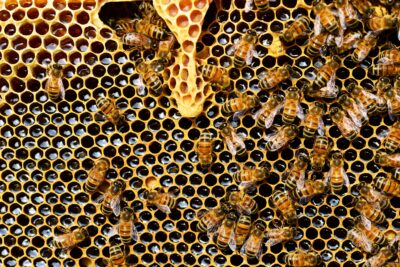The number of vegans in the UK continues to rise, as it does around the world. In less than 10 years, the number of vegans in the UK has mushroomed from 0.25% of the population to somewhere between 3-6%: from thousands of people to millions – with no signs of the trend going anywhere other than onwards and upwards. After years of being disparaged and ignored, veganism has broken out of its niche and taken root as a way of thinking, eating and living that is both accepted and respected.
What Are Veganism’s Origins In The UK?
There are records going as far back as the 1840s showing people were concerned about animal exploitation and chose to avoid eating any animal products. Such people were essentially vegan as we know it today, but back then, the word vegan was not in existence and animal-free eaters were called vegetarians. The first animal-free cookery book was published in 1849 by William Horsefell, entitled ‘Kitchen Philosophy for Vegetarians’, and it made mention that the recipes did not contain any butter or eggs.
This early, strictly animal-free philosophy of vegetarianism was diluted when The Vegetarian Society was founded in 1847. In order to appease some of the founding members who consumed eggs and dairy products, it was decided that the Society would focus solely on abolishing ‘flesh-eating’, and the consumption of eggs and dairy products would be deemed acceptable. Over the years to follow, there was much discussion and debate amongst members over the ethics of that position, with those choosing to eschew eggs and dairy known as ‘non-dairy vegetarians’.
Almost 100 years later, a non-dairy vegetarian member of The Vegetarian Society, Donald Watson, asked if the Society would promote a new sub-group that endorsed the position of not eating eggs and dairy products. His request was turned down. Undefeated, Donald convened a meeting of a small group of like-minded members to discuss forming a new organisation. He explained:
“…we were conscious of a remarkable omission in all previous vegetarian literature – namely, that though nature provides us with lots of examples of carnivores and vegetarians it provides us with no examples of lacto-carnivores or lacto-vegetarians. Such groups are freaks and only made possible by man’s capacity to exploit the reproductive functions of other species. This, we thought, could not be right either dietetically or ethically… and we could conceive of no spectacle more bizarre than that of a grown man attached at his meal-times to the udder of a cow.”
He had a point!
It was at this meeting, in November 1944, that The Vegan Society was born. The founding members decided calling themselves ‘non-dairy vegetarians’ was too much of a mouthful and coined the new word ‘vegan’ simply by shortening ‘vegetarian’. The new group’s mission was: “to seek an end to the use of animals by man for food, commodities, work, hunting, vivisection, and by all other uses involving exploitation of animal life by man”. The Vegan Society launched with 25 members, growing to 500 members at the end of the following year. It is no small achievement that Donald and his friends launched a new group to promote animal rights at the tail end of World War 2, a time of terrible human suffering and loss as well as food rations and shortages. It was not easy being vegan in those days.
In 1979, The Vegan Society became a registered charity and set out the official position it stands by today:
“a philosophy and way of living which seeks to exclude—as far as is possible and practicable—all forms of exploitation of, and cruelty to, animals for food, clothing or any other purpose; and by extension, promotes the development and use of animal-free alternatives for the benefit of humans, animals and the environment. In dietary terms it denotes the practice of dispensing with all products derived wholly or partly from animals.”
How Many Vegans Are There In The UK?
It is difficult to answer this question accurately because the question is not asked on the census and no central body collects the data.
The most recent statistic we have found is from data analytics firm YouGov, which runs a bi-annual tracker looking into the dietary choices of Brits. As of January 2023, the tracker places the number of people identifying as vegan at 3% of the population.
However, in February 2022, YouGov also published a YouGov Profiles report that was based on a compilation of continuously collected data and rolling surveys (rather than the results of a single, limited questionnaire, which can only give a snapshot of one moment in time). That report found vegans make up 6% of the adult population in Britain.
Another market and consumer research company, Statista, aggregated the results of four different surveys to conclude that between 2021-2022, the number of people in the UK aged 18-64 identifying as vegan rose from 3-4%.
According to these statistics, therefore, the number of vegans in the UK can be estimated as between 3-6% of the population. With the current population of the UK being 67.33 million, this equates to approximately 2,019,990-4,039,800 people.
Has Veganism Grown In The UK?
One thing we can say for sure is that interest in veganism has gone from a slow and steady climb to skyrocketing!
According to research carried out by Ipsos Mori on behalf of The Vegan Society, the number of vegans in Great Britain quadrupled in the five years from 2014 to 2019. In 2014, there were 150,000 vegans (0.25% of the population), in 2016 there were 276,000 (0.46% of the population) and by 2019, the number had risen to 600,000 (1.21% of the population).
Going by these numbers (the last available from The Vegan Society), we can conjecture that the number of vegans has slightly less than doubled every couple of years. If the trend continued on that trajectory, we can guestimate that the number of vegans in the UK in 2023 could be around 4% of the population, approximately 2,680,000 people. This number loosely aligns with the statistics found by the population surveys we mentioned earlier.
Another clear indication of how veganism has grown is the number of people signing up to participate in Veganuary, the annual ‘try vegan for a month’ initiative. For its launch campaign in 2014, 3,300 people signed up. This year – its 10th anniversary – the total number of participants was 706,965. A grand total of 2.5 million people around the world have taken part since the campaign’s inception.
How Many Students Are Vegan In The UK?
Again, it is difficult to find a definitive answer because, as with the general population, no central body asks for or collects this information. But we can categorically state that veganism is taking root in universities like never before.
For starters, Gen Z, the cohort born between 1997-2012 (in other words, the age range of people who are likely to be students) is highly motivated by health, sustainability and animal welfare. Following in the footsteps of their predecessors, the Millennials, Gen Z is regarded as driving the shift to more plant-based eating.
Students have always been passionate advocates and activists for a more equitable and sustainable world. Catalysed by student campaigns, many universities have divested from fossil fuels. An off-shoot of Extinction Rebellion, Plant-Based Universities is a student-led campaign group that is calling on all universities to divest from supporting animal agriculture and transition to 100% vegan menus.
In November 2022, Stirling University Students’ Union became the first in the UK to commit to serving only vegan food from 2025. It was followed in March 2023 by Cambridge University’s Students’ union voting in favour of removing all animal products. In April 2023, Cambridge’s Darwin College announced the menu at its May Ball would be fully vegan.
Several universities, including King’s College London, Royal College of Art and University of Leicester have fully vegan cafes, and University College London has become the first university to provide oat milk as the default instead of dairy milk.
What Percentage Of The World Is Vegan?
It is almost impossible to put a definite figure on the number of vegans in the world as there is no global organisation or agency that collates this data.
In 2018, global market research company Ipsos produced a report called “An Exploration into Diets around the World”. It found that, around the world, 3% of people identified as fully vegan, with a further 8% eschewing meat (5% of those being vegetarian and 3% pescatarian).
Which Country Is The Most Vegan In The World?
The country with both the highest percentage of vegans per capita and the largest total number of vegans is India. This is not surprising considering India is the second most populous country in the world with a population of more than 1.4 billion. Many Indian citizens are Hindu, Jain or Sikh and abstain from or limit their meat consumption for religious reasons. According to research by Pew Research Center in 2021, 39% of Indians identify as vegetarian and according to Statista, in 2021 9% of Indians were vegan. This equates to around 126,000,000 people.
Other countries with high percentages of vegans include the UK, Australia, Germany and Israel.
How Many People Plan To Give Up Meat In The UK?
According to research carried out in 2022 by Ipsos, 22% of British adults (16-75) identify as ‘flexitarian’ – in other words, they are mostly vegetarian but eat a small amount of meat/fish. The research found that overall, nearly half of UK adults intend to reduce their consumption of animal products, with 68% of flexitarians and 64% of vegetarians prepared to make further reductions and changes to their diet.
Conclusion
It is not as easy as you’d think to find specifics on the number of vegans in universities, in the UK, or around the world. But one thing is clear: those numbers are going up every year. We bet you know at least one person who’s vegan, right?
In 2021, BBC Good Food surveyed 1000 children aged 5-16 about their diet. The results were heartwarming: 8% of the youngsters identified as vegan, with 15% of those who weren’t already vegan saying they would like to be.
Veganism is a trend that isn’t going away and the number of vegans both in the UK and around the world will continue to grow each year. So take heart, there is hope the future will be vegan!





